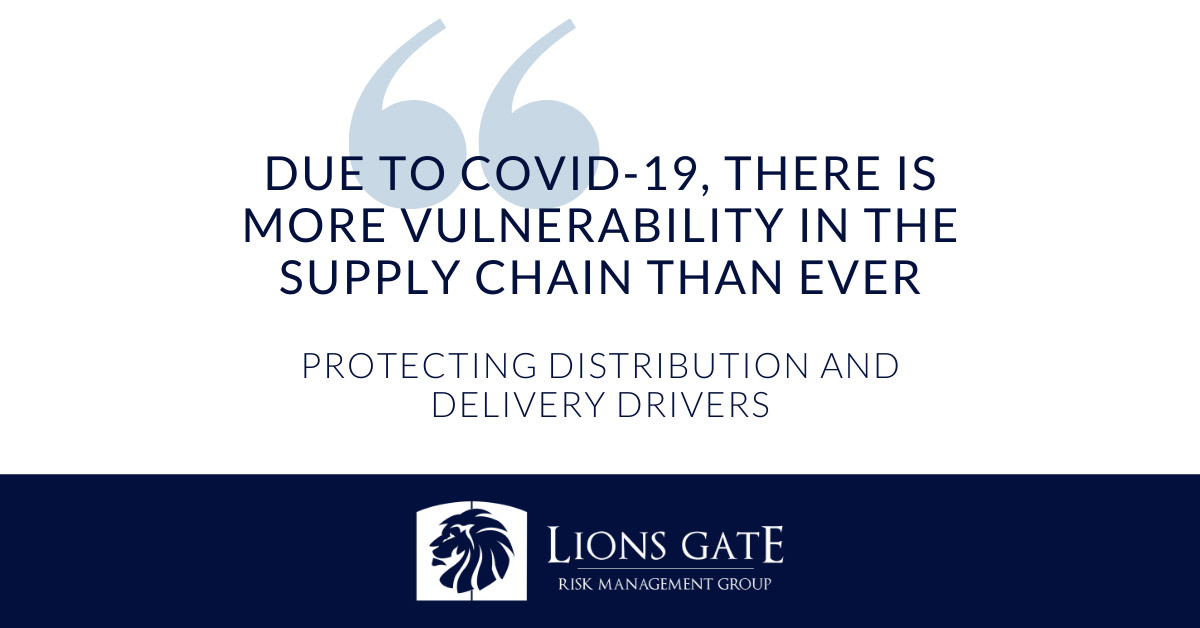- Home
- Articles
- Supply Chain Crime – Protecting Distribution and Delivery Drivers
8/12/2020
Supply Chain Crime – Protecting Distribution and Delivery Drivers

It may come as a surprise initially to learn that widespread severe income disparity contributes to supply chain crime. But that is and has been the case for almost a decade. That gap is increasing year over year and more so with COVID-19, and organized crime groups are salivating at the possibilities.
This infographic shows the progression from severe income disparity to wider security risks:

According to the World Economic Forum, COVID-19 continues to disrupt manufacturing and supply chains. Just ten years ago the forum prioritized environmental triggers of global supply chain disruptions like natural disasters 64%, extreme weather 30% and Pandemics 11%. Evidence of foresight there with pandemics but quite the reversal in priority. Hindsight certainly is 2020.
In the here and now, the Forum sought industry leadership advice to identify the best responses to the pandemic with the aim of building resilience in supply systems. The findings were featured in the white paper “How to rebound stronger from COVID-19: Resilience in manufacturing and supply systems,” considering three areas: immediate action, recovery and improved resilience, and adaptation to ensure long-term success.
Leaders are proactively taking action to protect employees, ensure supply security, mitigate the financial impact and navigate continued market uncertainty as demand drops. Companies have moved quickly to support suppliers (e.g. access to advanced network simulations), ensure cash liquidity and mitigate the impact on customers (e.g. extended payment terms, shifting freight modes) while contributing their part to society (e.g. repurposing manufacturing to produce essential goods).
Due to COVID-19, there is more vulnerability in the supply chain than ever. With people’s reduced income and an increase in mental health issues, the temptation for distribution workers and drivers, if approached and offered strong financial incentives, to become involved in collusion, will be significant. Vet staff, vet drivers, background check all new staff.
Reduce theft risk as a cargo semi driver and residential delivery driver:
- There is simply insufficient secured parking for road freight and no real motivation for developers to use larger tracts of land for such a low revenue purpose. Until facilities are required to meet security standards this will always be a problem.
- Always be aware of your surroundings from the moment you leave your distribution center to the time you arrive at your location.
- Always lock your doors and keep music at a low enough volume so that you can hear a person approaching or hear someone who may be trying to alert you that a suspicious person is near your vehicle.
- Be on alert and proceed cautiously if a vehicle strikes your trailer lightly from behind: it’s a known ploy. As you exit your vehicle to check for damages, the other driver may attempt to rob you.
- Always be aware of vehicles that seem very familiar—they may be following you from location to location as they look for an opportunity to rob you. Note the individuals in these familiar cars as well.
- Having radio communications with distribution operations is highly recommended. Lions Gate has a unique public-private partnership with Taber Police Service Dispatch and can facilitate a rapid law enforcement contact and response.
- Keep a notepad handy to make note of the colour, make, and license plate number of vehicles that you suspect could be following you. If you feel you are being followed, drive directly to a police department or flag down a police vehicle.
- All company fleet vehicles should be fitted with GPS Trackers and Video Surveillance Cameras. Be mindful that Organized Crime Groups can use sophisticated electronic devices to jam GPS tracking and even track loads on their own systems.
- When parking to unload your cargo, take a few moments to note your surroundings and check for suspicious individuals before you unlock your doors and exit your vehicle.
- Change your routes from time to time to avoid being followed. It’s a good habit to not let your driving routes become too predictable to throw off anyone who may be observing you.
- Make sure that both security managers and drivers have an accurate license plate, VIN, and descriptive information for tractors, trailers, containers, and container chassis. Police agencies will need this information to open an investigation in the event of an incident.
- Advise the delivery location of your imminent arrival.
- When delivering to a house, ring the bell or knock on the door always to alert householders.
- Encourage your organization to promote a delivery chain that is hand to hand wherever possible.
- Secure all trailers (loaded and unloaded) with high-security ISO 17712- compliant barrier seals in combination with hardened padlocks. Use king pin locks for unattached trailers.
- Secure all tractors with high-security locking devices, such as air-cuff and steering column locks.
- Avoid having loaded trailers sit unattended when employees are not present. Parking lots are the number one preference for thefts of loads. Lions Gate can assist in guiding truckers as to the required layers of security in these locations allowing the operator to make informed choices.
- The use of door security seals removes the opportunity for insider theft but not collusion.
We’re all in this together, especially as things ramp-up for the holiday season. Lions Gate is the ideal private partner to align with law enforcement and to share data. We have the talent within our team, and the capacity, to analyze the data and to take solution profiles to a next level. Reducing levels of victimization in communities reduces the burden on law enforcement, allowing a shift in approach towards more proactivity and prevention.
For any support and assistance call 1.604.383.0020 or toll-free at 1.800.212.2026 or visit www.lgrmg.ca at any time. Our expertise is your peace of mind.

